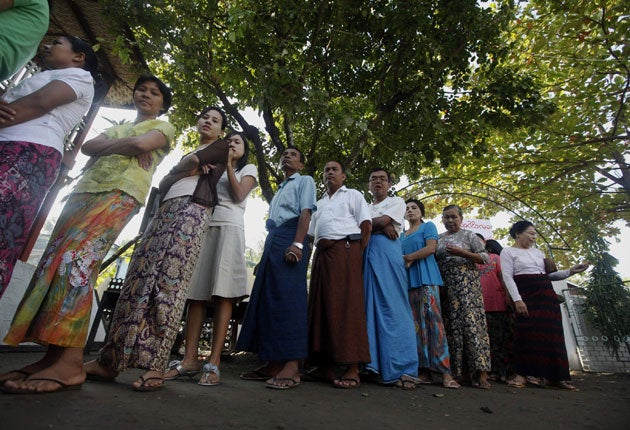Burmese election: 'We will vote for anything, but not our government'

It was Burma's first election in a generation, but the sight of a flak-jacketed policeman dozing on his rifle outside a near-deserted polling station on Rangoon's Mahabandoola Garden Street summed up the underwhelming atmosphere of the day.
Across the crumbling old colonial capital yesterday, where schools and public offices had been converted to polling stations, there were no crowds, no queues, and almost no signs of excitement about a vote that many Burmese believe is designed to do little more than paint a civilian façade on military rule.
Nevertheless, some voters regarded this deeply flawed process as their only opportunity to express a desire for change after half a century of oppressive military rule and ruinous economic policies.
"We will vote for anything, but not our government. We want to use this election to slap them in the face," said a middle-aged man waiting in the shade on a narrow side street for his wife to emerge from the decaying, 19th-century imperial office that housed his local polling station.
Where they are running, opposition candidates are confident of victory, but their small numbers mean they can only dent the overall result. Cho Cho Kyaw Nyein, 62, a candidate for the opposition Democratic Party which fielded around 50 candidates, said her tireless campaigning through the rainy season in the rural constituency of Gyo Bin Gauk should yield results. "For the past four months, I have been visiting half a dozen villages a day. Every step has been treacherous. I have lost count of the shoes I have lost in the mud. These people have been suppressed for 20 years and they were scared. But I think today they will be courageous and vote for me," she said.
An unscientific "teashop" poll in a northern suburb of Rangoon suggested turnout had been high, by lunchtime, three quarters of customers said they had voted, the rest said there was no one they wanted to vote for. Voters said they were pleased that there was anonymity on the ballot paper, something not all were expecting in a country with so little experience of democracy. For anyone under the age of 38, this was the first time they had cast a ballot in a national election.
In mid-morning, an armed police escort complete with motorcycle outriders delivered a state television crew to record an unquestioning report from a tidy high school polling station, highlighting the media restrictions and tight rules that have left many voters ignorant of the choices.
"I will vote for Aung San Suu Kyi," said a taxi driver rushing through a few fares before heading back to his township to vote. He wasn't aware that the detained Nobel peace laureate, whose National League for Democracy (NLD) party won 80 per cent of the votes in 1990, is boycotting the poll, and has called on voters to stay at home or spoil their ballot papers.
Foreign observers and journalists were banned from the election, and diplomats such as the British Ambassador, Andrew Heyn, had to watch the proceedings from a distance, parking across the street from polling stations and trying to get a sense of the fairness of the process.
"We weren't allowed inside the polling stations so it's hard for us to judge," Mr Heyn said. "But one thing is certain, the damage has already been done in the lead up to this election, meaning it cannot be a fair vote."
Ballots were to be counted inside the polling stations with agents of candidates allowed to observe the process. But there were concerns that these niceties would be overlooked, particularly in rural areas where voters have reported intimidation and vote-buying.
The authorities have declined to give an indication of when results can be expected, saying only that details of the vote counts would be released gradually. "We're looking at anywhere between 24 hours and a week," Mr Heyn said.
Join our commenting forum
Join thought-provoking conversations, follow other Independent readers and see their replies
Comments
Bookmark popover
Removed from bookmarks